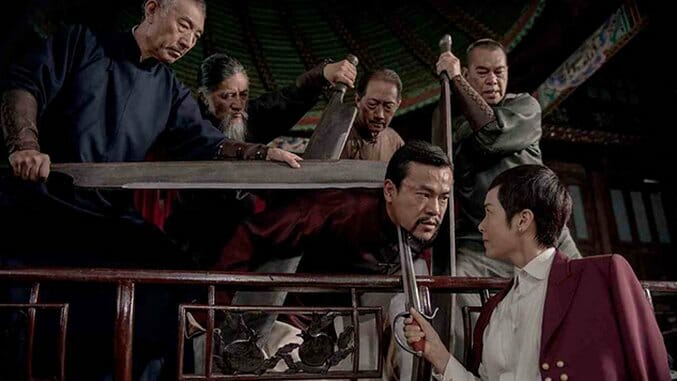
For anyone looking for a kung-fu saga bereft of anything resembling passion, thrills or even high drama, look no further than The Final Master. Actually, if you’ve seen writer/director Xu Haofeng’s first feature, The Sword Identity (2011), you’ll already have an idea what you’re in for: an obsession with martial arts history and tradition, with the dramatic stakes made stubbornly low and the stylistic temperature even lower. Xu also co-wrote Wong Kar-Wai’s 2013 Ip Man biopic The Grandmaster, and watching his two directorial efforts, one can’t help but yearn for Wong’s romantically melancholic touch to do something, anything to add some of the heat that is crucially missing.
Though the plot details of The Final Master and The Sword Identity are different, the themes they tackle are broadly similar. Questions of legacy are chief among them, especially when it comes to passing down martial arts traditions. In The Sword Identity, the servant of a late general who created a new form of martial arts to fight off Japanese pirates spends much of the film trying to challenge the masters of the four already extant martial arts schools in Guangcheng in order to establish a new school to keep his master’s fighting techniques alive. The threat of extinction of another martial art—Wing Chun, the self-defense method at the heart of the recent Ip Man craze in Chinese cinema—hangs over The Final Master as well, as Master Chen (Liao Fan) similarly aims to figure out a way to pass down his art so that it doesn’t get lost to history. His efforts in Tianjin, the center of martial arts back in 1912, run up against the obstacles of political and military maneuvering as well as his own internal conflicts.
If those bare-bones summaries make the films sound rather dry and academic, don’t expect Xu to be so easily accommodating if you don’t already have an interest in martial arts going in. Considering Xu’s odd cinematic style in The Final Master—strangest of all, coupled with a score by An Wei that keeps even the most seemingly dramatic of scenes feeling inconsequential—one wonders if he is, on some deeper level, aware of how insular his thematic preoccupations really are. But damned if he wont’ at least try to open those concerns up to a wider audience.
It might help if Xu were a better dramatist, on film at least. He’s also popularly known in China as a novelist and a martial arts scholar, but however well he may have dramatized his obsessions on the page—like The Sword Identity, The Final Master is adapted from his own novel—he’s awfully clumsy when it comes to characterization in his films, often putting stilted expository dialogue into people’s mouths to offer historical context and explain character motivations. The nadir in that regard comes early on in The Final Master, when Xu has Master Chen risibly deliver gobs of biographical backstory to his wife (Song Jia) while fighting off about 20 attackers.
Speaking of risible, Xu often attempts bits of comedy throughout both of his films (e.g., the three female exotic gold-digger dancers who latch onto Guangcheng soldiers in The Sword Identity; the scenes between Chen’s protege Geng (Song Yang) and his tea-serving maybe-love interest in this film), but his touch is so heavy that they instead pop like lead balloons. And though Chen supposedly loves his wife, there’s no chemistry between Liao Fan and Song Jia in any of their scenes, only a series of ostensibly romantic glances which the actors convey without much conviction.
Worst of all, the fight scenes carry no electric charge whatsoever. With Xu himself masterminding the choreography (as he did with the action in The Sword Identity), one can guess that this is where his real passion lies, and it’s easy to admire the obvious physical and technical skill put into these scenes. But without any dramatic involvement built into these confrontations, such sequences as Chen’s climactic alleyway confrontation between a bunch of opposing Master Zou’s (Jiang Wenli) henchmen become monotonous bores, with precious little variety in the slicing and dicing to give it any life. Then again, such intellectualized distance is par for the course in The Final Master. It aims for meditative, but barely even clears the bar of dullness.
Director: Xu Haofeng
Writer: Xu Haofeng
Starring: Liao Fan, Song Jia, Jiang Wenli, Chin Shih-Chieh, Song Yang, Huang Jue
Release Date: June 3, 2016
Kenji Fujishima is a freelance film critic, contributing to Slant Magazine, Brooklyn Magazine, The Playlist and the Village Voice. He is also Deputy Editor of Movie Mezzanine and former editor-in-chief of In Review Online. When he’s not watching movies and writing and editing film criticism, he’s trying to absorb as much music, art, and literature as possible. He has not infrequently been called a “culture vulture” for that reason.